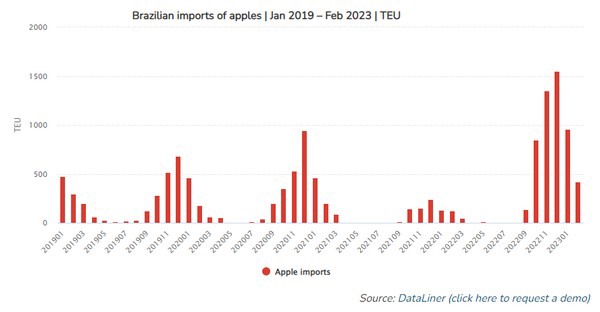Brazilian consumers most likely have noticed that the presence of European apples on supermarket shelves has been enormous. In fact, fruit imports grew in the second half of 2022 and early 2023. In addition to Chile and Argentina, traditional fruit suppliers to Brazil, imports from Italy and Portugal increased exponentially. However, market analysts expect imports to decrease from the beginning of the apple harvest in the country since the exchange rate makes European-grown fruits less competitive in the South American market.
According to Observatório Agro Catarinense website data, in January 2022, 775 tonnes of apples entered Brazil’s southern Santa Catarina, mainly from Argentina. In January 2023, the volume imported was 2.5 thousand tonnes, mainly from Italy. According to the Socioeconomics and Rural Development analyst at Epagri/Cepa, Rogério Goulart Jr., two factors influenced the growth in imports: low national apple stocks and the overproduction registered in some European countries.
Please find below Brazil’s apple imports (hs code 080810), in containers, between Jan 2019 and Feb 2023. The data is from DataLiner.
Santa Catarina crop
Goulart explains that, in the 2021/22 harvest, the volume of apples produced in Santa Catarina was lower than expected due to weather conditions. The crop suffered the effects of drought and excessive cold during the apple tree flowering period. This also affected the quality of the fruits left for storage, which led the regulators to encourage selling the remainder of the crop at the end of 2022. Another factor that influenced the supply of apples in the Brazilian market is that there was a delay in the current crop harvest (2022/23 ). As a result, the price of apples on the domestic market rose and made imports from Europe competitive.
A recent study has shown that large volumes were harvested in Santa Catarina throughout March, so the expectation is that the greater internal supply will bring imports down. “The tendency is for imported fruits to be sold at higher prices than domestic fruits during the Brazilian off-season,” Goulart explains. The estimated volume for the Santa Catarina apple harvest in 2022/2023 is 208.2 thousand tonnes of Fuji apples, 280.8 thousand tonnes of Gala apples, and 10.3 thousand tonnes of early-harvest apples. Santa Catarina is the largest apple producer in Brazil, accounting for 54.1% of the total national output.
For more information: datamarnews.com

